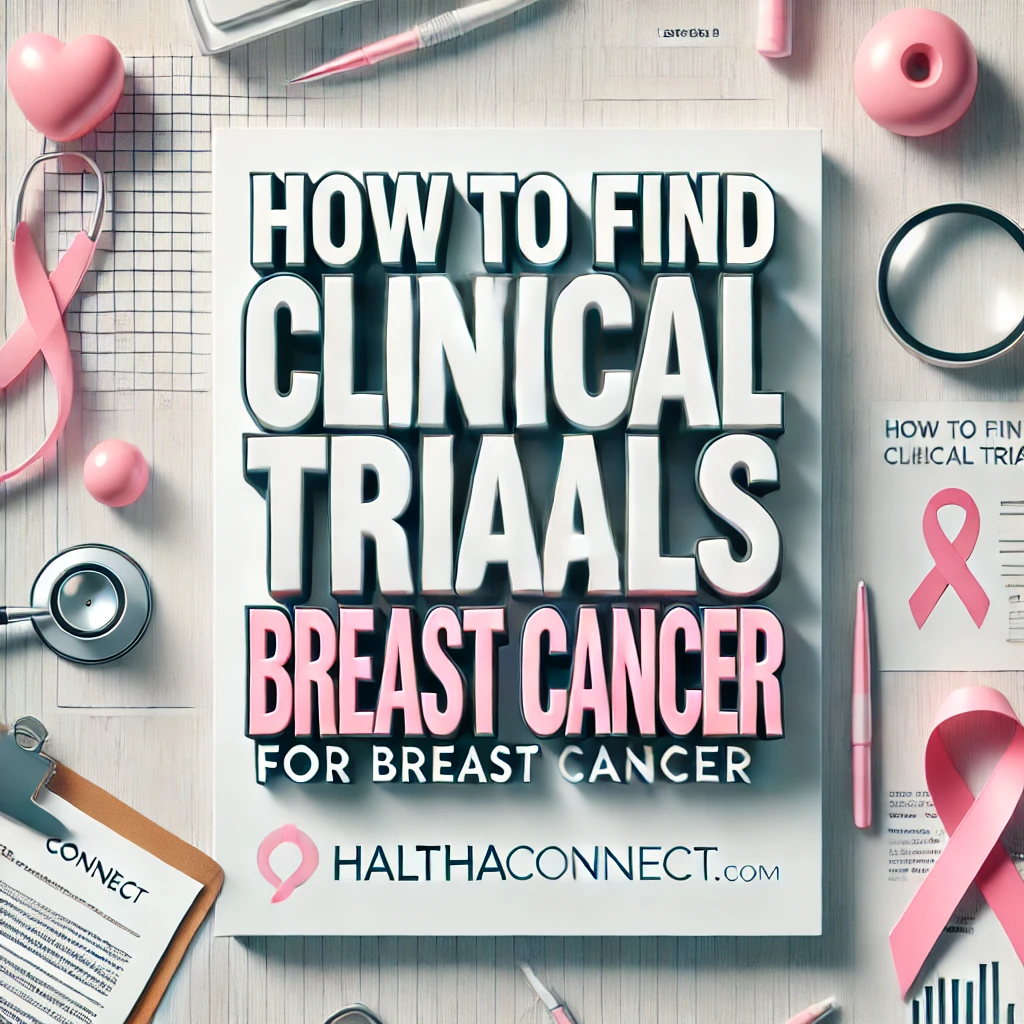The advancement of breast cancer treatments and the provision of patients with access to cutting-edge technologies depend on clinical trials. These studies evaluate novel medications, techniques, and approaches, thereby improving patient outcomes. Through their participation, people help to combat breast cancer and could gain from innovative therapies.
This guide will assist you in navigating the process of locating breast cancer clinical trials via Haltha by means of resources, techniques, and considerations to locate trials fit for your situation.
What Are Breast Cancer Clinical Trials?
Breast cancer clinical trials are tests of newly proposed therapies for the disease. These studies explore experimental treatments, including novel medications, pharmacological combinations, or therapeutic techniques. Participating in a clinical trial gives patients the chance to obtain experimental therapies that are not yet generally accessible and helps to further medical understanding.
Who Can Participate in Breast Cancer Clinical Trials?
The particular research and its goals will considerably affect the eligibility requirements for clinical trials for breast cancer. Usually, these criteria might include elements like the patient’s treatment history, the kind of breast cancer, e.g., hormone receptor-positive, HER2-positive, as well as the stage of disease.
Clinical studies are arranged according to patient condition:
- Early-stage breast cancer clinical trials. Usually including individuals diagnosed with localized breast cancer, these studies concentrate on assessing novel treatments or therapies used after radiation or surgery.
- Advanced breast cancer clinical trials. Patients with locally advanced breast cancer, where the illness has progressed to adjacent lymph nodes or tissues, may be qualified for studies evaluating cutting-edge medicines meant to control the disease and improve outcomes.
- Metastatic breast cancer clinical trials. These studies concentrate on those whose breast cancer has progressed to far-off areas of the body. They may investigate new systemic treatments to control symptoms and extend life.
Patients may have to satisfy certain requirements, including age, general health, and particular tumor features, to qualify for a given study. See a healthcare professional to go over personal eligibility and possible risks and rewards.
How to Find Clinical Trials for Breast Cancer
Selecting the right clinical trial for your specific requirement might be difficult. As you follow the process, this guide will assist you in traversing the many phases and identifying any challenges.
Step 1: Use Online Clinical Trial Databases
Using reliable online clinical trial databases makes finding breast cancer research simple. These trustworthy references are available here:
- Haltha
Haltha is an advanced platform designed to provide users with high-paying clinical trial listings, offering personalized suggestions tailored to individual needs. The website’s user-friendly interface ensures a seamless experience, allowing easy navigation through the various available trials. Haltha not only helps users find the best clinical trial opportunities but also offers access to expert guidance, assisting throughout the process from trial selection to enrollment.
- ClinicalTrials.gov
An extensive database is kept up to date by the U.S. National Library of Medicine, which includes details on both officially and privately sponsored clinical investigations.
- BreastCancerTrials.org
Providing tailored trial pairings based on patient profiles, a user-friendly platform especially targeted at breast cancer studies.
- National Cancer Institute (NCI) Clinical Trials Database
Including those for breast cancer, the NCI has a strong database of clinical trials that are searchable by several parameters.
- EmergingMed Clinical Trial Navigator
A service enabling people to locate relevant clinical trials depending on their preferences and medical background.
- Local cancer centers and research hospitals
Many local institutes do clinical studies and could provide particular chances for local residents.
Step 2: Talk to Your Oncologist
You should talk to your doctor about available clinical trials. Your doctor can give insightful analysis of which studies would be most appropriate for your particular cancer type and medical background. Often, with access to the most recent data on continuing research, oncologists might suggest investigations that are consistent with your therapeutic objectives. Helping you evaluate the prospective risks and benefits of participating in research guarantees that you make sensible decisions on your treatment.
Step 3: Join Patient Advocacy Groups
For people seeking clinical trials, several organizations supporting breast cancer, such as Susan G. Komen and Breastcancer.org, offer resources and support. These groups may link you with other patients who have negotiated similar circumstances and often provide tools for trial-finding. Along with providing access to important information, combining these groups helps you feel supported and part of a community during your breast cancer path.
Using these tools and cooperating with your healthcare team can help you investigate the prospect of taking part in a clinical trial, advancing your treatment choices and thus supporting scientific advancement in the battle against breast cancer.
Types of Breast Cancer Clinical Trials Available
Clinical trials for breast cancer provide a variety of chances for patients to get modern therapies and help to develop medicine. The following are many typical forms of clinical research on breast cancer:
- Prevention and screening trials. Although less prevalent, preventive and screening studies are vital for high-risk populations. These experiments might probe:
- Chemoprevention. Especially in high-risk people, the use of drugs helps lower the chance of breast cancer;
- Improved screening methods. Modern imaging technology and blood testing are two new approaches for early breast cancer screening.
- Treatment trials for early-stage breast cancer. Early-stage breast cancer treatment studies can test novel drugs, drug combinations, or radiation treatments. These tests might concentrate on:
- Adjuvant therapy. Procedures performed after surgery to lower cancer recurrence risk;
- Neoadjuvant therapy. Treatments are meant to diminish the tumor given before surgery.
- Metastatic breast cancer clinical trials. Most exciting studies on metastatic breast cancer center on creating creative treatments to control the disease, which has progressed to different organs of the body. These tests could look at:
- Immunotherapy. Treatments are meant to combat cancer cells by using the immune system of the body;
- Targeted therapies. Medications aiming at certain molecular alterations in cancer cells;
- Combination therapies. There are many therapies used to improve outcomes.
- Genomic and precision medicine trials. In genomic and precision medicine, trials aim to match treatment to a patient’s individual genetic makeup or malignant genetic profile. These tests may demand:
- Genetic testing. Identifying specific genetic variations influencing therapeutic response;
- Personalized therapies. Creating therapies aiming at the particular genetic profile of a tumor in a patient.
Patients who take part in the most promising metastatic breast cancer trials may receive possibly life-saving medications, support medical research, and assist in defining the direction of breast cancer therapy.
How to Apply for Breast Cancer Clinical Trials
Applying for breast cancer clinical trials is a crucial step for those seeking cutting-edge treatment options and contributing to important research. At Haltha, we provide a streamlined application process to help you navigate clinical trials and find the most suitable studies for your needs. Here’s a detailed guide on how to apply for breast cancer clinical trials through our platform:
Eligibility Criteria
The specific eligibility criteria for breast cancer clinical trials may vary, depending on the nature of the study. However, common factors that most trials consider include:
- Cancer stage. Participants may be required to have a specific stage of breast cancer, such as early-stage or metastatic, depending on the focus of the trial.
- Previous treatments and responses. Clinical trials in Haltha often assess a participant’s treatment history, including past treatments and their responses. This information is crucial for determining eligibility and understanding how a new treatment might benefit you.
- Age, overall health, and specific biomarkers. Certain trials may have age restrictions or require participants to meet specific health criteria. Additionally, some Haltha studies target particular biomarkers related to breast cancer, which could influence eligibility.
By understanding these eligibility requirements, patients can set realistic expectations and find trials that best align with their condition.
Enrollment Process
At Haltha, the enrollment process for breast cancer clinical trials is designed to be efficient and patient-friendly. Here’s how you can apply:
Step 1: Research Appropriate Trials
Search appropriate studies depending on your medical history and cancer type using reliable databases such as Haltha.
Step 2: Contact the Trial Sponsor or Research Team
For comprehensive information on the goals, procedures, and eligibility criteria of the study, contact the trial sponsor or research team.
Step 3: Complete Pre-Screening Tests
To find your eligibility, schedule required pre-screening exams ranging from medical examinations to blood tests to imaging investigations to biopsies.
Step 4: Enroll in the Trial
If you fit the requirements, register by completing permission forms and talking to the study staff about any questions or concerns.
Following these guidelines enables patients to effectively negotiate the application process for breast cancer clinical trials, access novel treatment choices, and assist in further breast cancer research.
What to Expect from a Breast Cancer Clinical Trial
For patients, taking part in a breast cancer clinical trial may be a life-changing event that provides access to the most recent medicines and supports medical research. Making a wise choice, however, depends on knowing what to anticipate from the process. Important elements like time commitment, possible hazards and rewards, and expenses related to clinical trials are described in this part.
Time Commitment
The phase of the experiment and the particular treatment plan will affect the time dedication required in a clinical study. While later-phase studies may call for fewer frequent visits, early-phase trials often call for more frequent visits for monitoring and therapy.
Potential Risks and Benefits
Clinical studies include possible hazards as well as rewards, just like any medical therapy.
- Benefits:
- Access to new treatments. Clinical trials provide the chance to get experimental treatments that are not often accessible outside of the study;
- Close monitoring. Medical professionals actively watch clinical trial participants to enable early identification and treatment of any negative effects;
- Contributing to medical advancement. Participating in a clinical trial will allow you to help expand medical knowledge and improve the present treatment options for others.
- Potential risks:
- Side effects. Many times, clinical studies include experimental therapies with side effects, some of which might be major;
- Uncertainty about treatment effectiveness. Although clinical studies try to assess novel medicines, their final efficacy is always debatable.
Costs and Insurance
Do cancer trials cost money? Generally speaking, clinical trials do not charge participants for experimental treatments or medical procedures. Though some studies may compensate for personal expenditures like travel and housing, participants might have to pay for them. Ask your insurer about coverage for study-related fees. Plans vary. Think about the advantages and drawbacks, see your doctor, and carefully review the informed consent form to help you decide on involvement.
Most Promising Metastatic Breast Cancer Trials
In oncology, metastatic breast cancer, where cancer has progressed outside the breast to other organs, remains a major obstacle. Advancing therapy choices at this stage of the illness depends much on clinical trials, which provide patients access to creative remedies often not accessible via conventional treatment. The present developments in metastatic breast cancer therapies will be discussed in this section, along with pointers on how to keep updated on new clinical trials.
Current Advancements in Metastatic Breast Cancer Treatments
With an eye on improving patient outcomes, new research on metastatic breast cancer is stressing several creative therapeutic modalities. Among the most promising metastatic breast cancer trials are some:
- Immunotherapy
This research examines targeting and killing cancer cells using the immune system. While research is still in progress, immunotherapy has shown promise in treating many tumors, including metastatic breast cancer.
- Targeted therapy
Trials in this group focus on medications meant to target certain genetic alterations or abnormalities seen in cancerous cells. By concentrating on certain genetic features, targeted therapies might possibly block growth and slow down the spread of cancer, therefore avoiding damage to healthy cells.
- Combination therapies
To identify more successful treatment plans, researchers are investigating fresh combinations of immunotherapy, targeted therapy, and chemotherapy. These combination treatments seek to maximize the advantages of many therapeutic approaches by means of which patient outcomes may be enhanced, and disease development can be controlled.
How to Stay Updated on New Trials
Patients and caregivers rely on being current with the most recent developments in clinical research on metastatic breast cancer. These techniques help one keep updated on the most exciting metastatic breast cancer studies:
- Sign up for alerts. Many clinical trial databases provide email notifications informing members of new studies. Websites offering this service include ClinicalTrials.gov and BreastCancerTrials.org;
- Join patient advocacy organizations. Groups like Susan G. Komen and Breastcancer.org often provide information on fresh studies and trials. Reading their newsletters or becoming a member or subscriber will keep you current;
- Follow research hospitals. Many top cancer research facilities and institutions provide newsletters and updates on their websites. Following these will enable you to remain current with the most recent trials and developments.
By using these tools, patients may remain in touch with the most recent studies and have chances to take part in clinical trials, thereby possibly getting innovative medicines with great impact on their treatment.
Conclusion
Participating in breast cancer clinical trials helps patients greatly advance the discipline of cancer research. These studies provide access to creative therapies that may not be accessible elsewhere outside of a clinical trial environment. Those who volunteer help to create novel treatments and maybe enhance the results for the next generations of breast cancer sufferers.
Should you be thinking about taking part in clinical research, you should talk to your doctor about your choices. They can assist you in ascertaining if a clinical trial is the best match for you and help you grasp the possible advantages and drawbacks.




